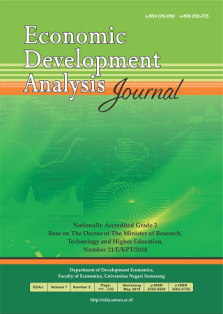The Effect of Budget Deficit in Indonesia: A Comparative Study
Abstract
This study aims to analyze the relationship between budget deficits and economic growth based on Keynesian, Neoclassical, and Ricardian Equivalent theories, and to explain the relationship between inflation, poverty, world crude oil prices, and government consumption on economic growth. Time-series data in Indonesia from 1981 to 2019 were analyzed using the Domowitz-El Badawi ECM and VAR methods. The results show that the Ricardian Equivalence is proven to have occured in the short-term in Indonesia, while in the long-term, budget deficit shows a positive impact on economic growth in Indonesia and supports the Keynesian perspective. In the short term, only inflation and government consumption show an impact on economic development: while inflation has a negative effect. In the long run, budget deficit, inflation, poverty, and world oil prices all affect economic growth, while government consumption does not. This proves that government consumption, a fiscal policy, is a policy that has only a short-term effect on economic growth. This study recommends that policies financed by budget deficit are used for long-term investments, such as investment in the education, health, and infrastructure sectors, in order to generate a long-term effect on economic growth.


